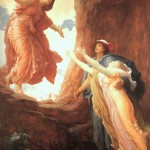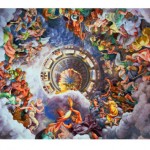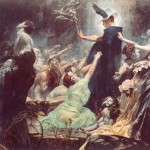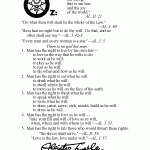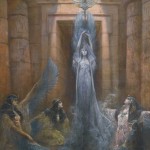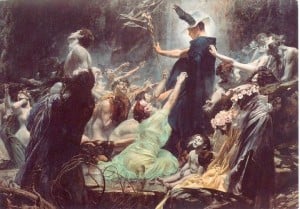 Is the world alive? For most of the ancient world, the world itself was alive and everything in it was alive too, having a spirit with personality and agency. Hermes, as Herald, Guide of Souls, and consummate magic wielder is a friend to the spirits. But in the Pagan/Polytheist community there seems to be something of an argument about the nature, place, and character of Spirits…
Is the world alive? For most of the ancient world, the world itself was alive and everything in it was alive too, having a spirit with personality and agency. Hermes, as Herald, Guide of Souls, and consummate magic wielder is a friend to the spirits. But in the Pagan/Polytheist community there seems to be something of an argument about the nature, place, and character of Spirits…
One of the odder debates going on in our Pagan community has to do with animism. I suppose it is similar to the theist debate. Recently the keynote speaker at Many Gods West 2016 was replaced because she was an animist not a polytheist. I’d like to know how each of those ideas were framed, because (poly)theism is a variety, a subset, of animism. Where is the conflict, or is this some new orthodoxy? Others, like Peter Gray, call for a renewed animism, learning to perceive and work with the spirits in all, along with the almost obligatory call to ‘return to the wild’. We would do well to learn to perceive the spirit-filled world, but that last notion has its issues. I’m a city boy, and the requirement on me is to find spirit on the train (where I’m writing this), in the concrete and steel of the city, in the geomantic currents that only large constructs can produce. I did my wilderness work before I was 20. Now my task is to sacralize the city. Dualising the city with some notion of a pure ‘nature’ or the wild, especially since that is not where I live, seems counter-productive to me.
Animism is rooted in the experience we have of interacting with all other things as though they are persons. In this, we treat those relations are just like the rest of our interactions with humans. We are in the habit, as it were, of talking to non-humans as though they were humans. For instance, I know very few people who don’t talk to their cars or swear at their computer. This is basic anthropomorphism. Animism happens when we hear Them answer. Everything can answer, and some would argue, everything does. Our task to to learn to listen (or use whatever modality suits). Learning to do so has long been a part of the training of magi, and many witches learn to also.
Some experience the Gods, some don’t. Indeed, many today are not trained in how to attend to the spirit realm and so miss out on knowing that the world and all in it is imbued with life and spirit. Mostly it is a matter of stilling your thoughts and energies, and learning to listen and pay attention, but it requires actually doing so. Discussion is irrelevant, but a bit of theory can help with understanding and focus…
Animism is half of a structural and complementary dual. It’s opposite pole is that of Dynamism, and together they form one of the main axes of how the Living World presents Itself to our awareness. On the one hand is the experience of the powers and presences of the world as having personhood, with faces and mouths, as to were to talk to, personalities to negotiate with, and desires to entice or withhold. In the ancient world, almost everything was explained by having a spirit component, such as diseases being the result of demonic activity, the very planets being moved about by angels, and so forth. However, not all phenomena were seen as having personality. There were also forces in the world, and ancient practices like light-guiding or Photogogia, or manipulating the pneumatic sheath of the soul were powers that humans could effect and wield. The greatest of the dynamistic ancient traditions is Taoism, where the Tao, the Te, the Yin, the Yang, and Chi all flow through the world. They can not be negotiated with or bribed, but can be managed and manipulated.
One of the great succinct descriptions of the animist-dynamistic dual is in Arnold Van Gennep’s The Rite of Passage, the book that gave us the term in 1905. He points out that humans the world over use animistic and dynamistic approaches in ritual, on occasion at the same time. These two notions are not exclusive but complementary. Sometimes the ritual is addressed to Powers as persons, to be asked, bribed, or sometimes coerced into acting on our behalf. At other times, ritual uses forces like purification, energy (chi, qi, mana, prana, etc.), blessing, light, etc., to get the work done, but without ‘talking’ to ‘someone’ about it. The force is wielded directly by the practitioner. In circle we may invoke the Goddess to presence, but then we also raise and send of cone of power.
Theism is a kind of animism in that it’s focus is on agentful beings to be worshiped, propitiated, and generally communicated with. The attention is on the Great Ones we generally call the Gods, sometimes to the neglect of the Lesser Ones, the spirits of place and time, for instance. The ancients, like Iamblichus, counseled that we remember the entire retinue of the Deity we are worshiping, and that we should also be sure to sacrifice to the local spirits of place, and nation, and so forth, so as to establish good relations with all, and receive the spiritual development that comes with it. Having ‘faces’ and ‘mouths’ we can talk with Them and engage with Them much like with humans. We do well to remember that They are nothing like humans and that Their appearances are tailored for our needs. As the ancient Greeks said, dogs see the Gods in canine forms, cows in bovine, and humans in anthropomorphic form.
But still more importantly, we need to cultivate the maturity to experience the Divine not only as spirits with personality, but also as powers. With a bit of practice every Divine interaction can be experienced in animistic or dynamistic manner, or in both at the same time. Indeed, the radiance of a Deity is no less a manifestation of the Deity than any words They say. Some, of course, can only (as yet) experience Them one way or the other. With maturity, and the development of the non-dual perspective, or by transcending the either/or logic of Parmenides, we can experience the Deities in both manners. Indeed, once in deep contemplation, I asked if the Supreme Ultimate had personhood, or was just an impersonal power. Somehow my question provoked response and the Great Lady pinned me to the ground like a bug to a card. Leaving me no room for body or in mind to move, She pointed out to me how the very question was rooted in my limited human awareness and thus the problem, and the question, was mine alone. The Gods Themselves transcend any such notions of personhood or power. I’m the one trying to limit Them to one or the other. This was presented to me in quite unequivocal, and somewhat uncomfortable terms. It had the feel of being corrected, not to say chewed out, by an elder Aunt. YMMV….
Learning to experience the world as alive and inhabited by agent-full beings is a critical stage in Pagan spiritual development. It moves us past constructs of thought and belief into relationships with our many, many, neighbors. Knowing Them, we are inspired to defend their homes and habitations which others see as only a forest or a stream; resources to be used. “Someone else is using that right now! It’s Their home!” becomes the natural response to environmental encroachment when we make friends with the spirits of the world.
They, in their turn, also protect us. The Sanskrit term for these spirits is the Loca Pala, which points to our term for Their beneficence: luck. Luck is the gift of good fortune which comes when we support and are supported by the local spirits. As we care for Them, acknowledging Their presence, defending Their homes, putting out offerings for Them, They take us under their protection, fend off ill fortune, and prevent malicious or predatory spirits from harming us and our lives. They are also known for giving things a nudge in the right direction at critical moments.
Ultimately, I feel there is great value in learning to experience the world as alive and filled with living, feeling, sometimes thinking, volitional beings. We realize we are not alone. We realize that we have obligations in all our relations. We come to know the world and all its inhabitants as our family, and to care for it as tenderly.

